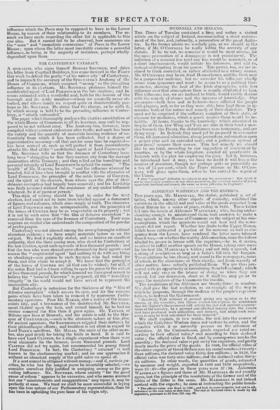OTONNELL AND IRELAND.
THE Times of Tuesday contained a -:ittng and rather a violent article on the subject of Ireland, recommending a strict enthreement of the-law, and, indirectly, a prosecution of the great Agitator. In the former advice we cordially join, as we should in the latter, if Mr. O'CONNELL be really within the severity of any statute. If he be not, we conceive it would be most unwise, for the merm. prosecution of a demagogue is not punishment. The infliction of a nominal fine (and any fine would be nominal), or of a short imprisonment, would irritate • his followers, and mid to, instead of detracting from his power. This power, too, we are inclined to think overrated, or rather attributed to a wrong source. NIr. O'CONNELL may be an /rish Demosthenes, and the Irish may be a gunpowder audience, but we consider his influence chiefly arises front ignortsnce and want : he seems to us a political thermometer, showing the heat of the Irish atmosphere, with less influence over that atmosphere than is usually attributed to him. This influence, too, we are inclined to think, would visibly decline with the remedy of abuses and the increase of knowledge. Our governorsboth here and in Ireland—have afflicted the peoplewith plagues, and, as far as they were able, have kept them in ignorance both of the nature and remedy of' their disorders. They must not be surprised if the sufferers complain of their state, or clamour for medicines, which a quack assures them wuul,l be in At home, thanks to the knowledge which circulated in despite of them, (for Whig and Tory are alike in their tender mercies towards the Press), the disturbances were temporary, and are dying away. In Ireland, they must yet be prepared to encounter them, till increased education, cheap journalism, colonization upon a proper plan and an extended scale, and a judicious system of poor-laws,* remove their causes. This last remedy we should like to see tried, according to our suggestion of assessment by counties, or by the whole kingdom, coupled (if practicable in Ireland) with the plan for employing the poor. Let it, however, be introduced how it may, we have no doubt it will lessen the number of absentees, though not perhaps quite so powerfully as a tax of 75 per cent., which the Times informs us Mr. O'Cosxtur will place upon them, when he has carried the repeal of the Union.
* One " practical" difficulty is—who is to pay the asessnient ? lint might it not be asiessed by moieties, or any other proportion, fin. a eLTIatin num4er of gears, upon both landlord and tenant, the same as many jaiL-rates in England?


























 Previous page
Previous page